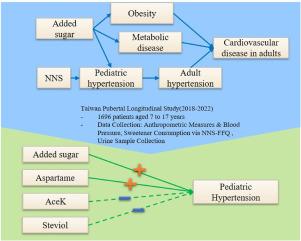Varied effects of sweeteners on pediatric hypertension: A multicenter study
IF 7.4
2区 医学
Q1 NUTRITION & DIETETICS
引用次数: 0
Abstract
Background & aims
The link between sugar-sweetened beverage consumption and metabolic syndrome has prompted the use of non-nutritive sweeteners(NNS). However, emerging evidence links NNS to elevated cardiovascular risk in children. This study examines the association between sweetener consumption and pediatric hypertension to guide cardiovascular health recommendations for children.
Methods
The Taiwan Pubertal Longitudinal Study, initiated in July 2018, is a multicenter, prospective cohort study involving 1696 patients aged 7–17 years. Baseline dietary exposures were collected using the validated NNS Food Frequency Questionnaire covering acesulfame potassium(AceK), aspartame, sucralose, glycyrrhizin, steviol glycosides, sorbitol, and added sugars. Spot urine samples were collected concurrently. Anthropometric and blood pressure measurements were recorded every 3 months. Pediatric hypertension was defined as systolic or diastolic blood pressure at or above 95th percentile for age, sex, and height, using the measurement closest to dietary assessment. Multivariate generalized linear mixed models were used to examine associations between sweetener exposure and pediatric hypertension, adjusting for age, sex, z-BMI, family history of hypertension, total calorie intake, sodium intake, physical activity, parental education, and household income. Participants were recruited on an ongoing basis, and data collected from July 2018 to September 2022 were analyzed.
Results
Aspartame and added sugars were dose-dependently associated with increased pediatric hypertension risk (aspartame: OR = 1.69, 95%CI:1.03–2.75; p = 0.04; added sugar: OR = 2.63, 95%CI:1.50–4.60; p < 0.001), while steviol glycosides showed borderline protective effects (p for trend = 0.05). AceK was negatively associated with hypertension in girls (OR = 0.30, 95%CI:0.09–0.98; p = 0.05), whereas aspartame was positively associated with hypertension risk in boys (OR = 3.13, 95%CI:1.30–7.54; p = 0.01). The association between added sugar intake and hypertension was stronger in overweight children. Substituting added sugars with NNS was associated with lower hypertension risk. Urinary biomarker analysis further supported the inverse association between AceK and hypertension, particularly in girls.
Conclusion
This study demonstrated that aspartame and added sugars were associated with a higher pediatric hypertension risk, while steviol glycosides were linked to lower hypertension risk. Replacing added sugar with NNS was associated with lower pediatric hypertension risk. These findings emphasize the need for tailored dietary guidelines and further investigation on sweetener use in children.

甜味剂对儿童高血压的不同影响:一项多中心研究
背景和目的含糖饮料与代谢综合征之间的联系促使人们使用非营养性甜味剂(NNS)。然而,新出现的证据表明神经性神经衰弱与儿童心血管风险升高有关。本研究探讨了甜味剂消费与儿童高血压之间的关系,以指导儿童心血管健康建议。台湾省青春期纵向研究于2018年7月启动,是一项多中心、前瞻性队列研究,涉及1696例7-17岁的患者。使用经过验证的NNS食物频率问卷收集基线饮食暴露,包括乙酰磺胺钾(AceK)、阿斯巴甜、三氯蔗糖、甘草酸、甜菊糖苷、山梨醇和添加糖。同时采集尿样。每3个月记录一次人体测量和血压测量。小儿高血压被定义为收缩压或舒张压在年龄、性别和身高的第95百分位或以上,使用最接近饮食评估的测量方法。多变量广义线性混合模型用于检查甜味剂暴露与儿童高血压之间的关系,调整年龄、性别、z-BMI、高血压家族史、总卡路里摄入量、钠摄入量、身体活动、父母教育程度和家庭收入。持续招募参与者,分析2018年7月至2022年9月收集的数据。结果阿斯巴甜和添加糖与儿童高血压风险增加呈剂量依赖性相关(阿斯巴甜:OR = 1.69, 95%CI: 1.03-2.75; p = 0.04;添加糖:OR = 2.63, 95%CI: 1.50-4.60; p < 0.001),而甜菊糖甙具有边缘保护作用(p = 0.05)。AceK与女孩高血压呈负相关(OR = 0.30, 95%CI: 0.09-0.98; p = 0.05),而阿斯巴甜与男孩高血压风险呈正相关(OR = 3.13, 95%CI: 1.30-7.54; p = 0.01)。在超重儿童中,添加糖摄入与高血压之间的关联更强。用NNS代替添加糖与降低高血压风险相关。尿液生物标志物分析进一步支持AceK与高血压之间的负相关,特别是在女孩中。结论:本研究表明,阿斯巴甜和添加糖与儿童高血压风险增加有关,而甜菊糖甙与高血压风险降低有关。用NNS代替添加糖与降低儿童高血压风险相关。这些发现强调了制定量身定制的膳食指南和进一步调查儿童甜味剂使用情况的必要性。
本文章由计算机程序翻译,如有差异,请以英文原文为准。
求助全文
约1分钟内获得全文
求助全文
来源期刊

Clinical nutrition
医学-营养学
CiteScore
14.10
自引率
6.30%
发文量
356
审稿时长
28 days
期刊介绍:
Clinical Nutrition, the official journal of ESPEN, The European Society for Clinical Nutrition and Metabolism, is an international journal providing essential scientific information on nutritional and metabolic care and the relationship between nutrition and disease both in the setting of basic science and clinical practice. Published bi-monthly, each issue combines original articles and reviews providing an invaluable reference for any specialist concerned with these fields.
 求助内容:
求助内容: 应助结果提醒方式:
应助结果提醒方式:


